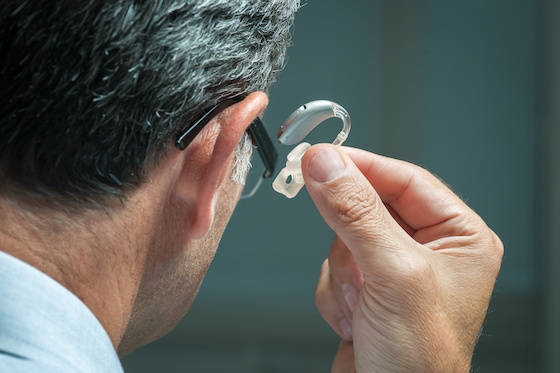
Man inserts hearing aid in his ear
Some of the health hazards associated with electric drives are obvious: we all know that electricity can shock us and hot surfaces can burn us. But there are other, hidden dangers for people with certain kinds of implants.
Potential Risks
People with heart pacemakers, metal implants, and hearing aids may be in danger when they are near electric drive systems, primarily due to the electromagnetic fields generated by these systems. Electric drive systems produce electromagnetic radiation, which can interfere with the functioning of sensitive medical devices. The interaction between these electromagnetic fields and the implanted medical devices may disrupt their operation or cause unintended effects.
Heart Pacemakers: Heart pacemakers are electronic devices that regulate the heart’s rhythm. They rely on electrical signals to function properly. When exposed to strong electromagnetic fields, the signals generated by electric drive systems can interfere with the pacemaker’s operation, potentially leading to irregular heartbeats or other complications.
Metal Implants: Metal implants, such as joint replacements or screws, may also be affected by electromagnetic fields. These fields can induce electrical currents in the metal implants, causing localized heating or discomfort in the surrounding tissues. Furthermore, the electromagnetic interference may interfere with the accurate functioning of implanted medical devices, such as neurostimulators or drug pumps.
Hearing Aids: Hearing aids are intricate electronic devices designed to amplify sound and improve hearing. Strong electromagnetic fields near hearing aids can cause distortion or interference in the audio signals, affecting the wearer’s ability to perceive sounds accurately. While this can sometimes be no more Ethan an inconvenience, unexpected loss of hearing acuity could mean an individual can’t hear warning sounds.
Precautions and Safety Measures
To ensure the safety and well-being of individuals with medical implants, it is crucial to take appropriate precautions when working with or in the vicinity of electric drive systems.
Here are some key safety measures to consider:
- Establish Warning Zones: Designate specific areas where individuals with medical implants should exercise caution or avoid altogether. Clearly mark these zones with appropriate signage to alert personnel of potential risks.
- Maintain Safe Distances: Determine the safe distance required between the electric drive systems and individuals with medical implants. Consult the manufacturers of the medical devices for guidance regarding safe distances and field strengths.
- Conduct Risk Assessments: Perform comprehensive risk assessments to identify potential electromagnetic radiation sources and their potential impact on individuals with medical implants. This assessment should include an evaluation of the workplace environment, equipment installation, and possible sources of electromagnetic interference.
- Implement Shielding Measures: Implement electromagnetic shielding techniques, such as enclosing electric drive systems in Faraday cages or using shielding materials, to minimize the spread of electromagnetic fields and reduce their impact on nearby medical implants.
- Provide Personal Protective Equipment (PPE): For individuals working directly with electric drive systems and having medical implants, consider providing appropriate PPE, such as electromagnetic shielding garments, to mitigate the potential risks.
- Promote Awareness and Training: Educate employees and personnel about the risks associated with electromagnetic fields and the precautionary measures to be followed. Raise awareness about the warning signs and symptoms that may indicate interference with medical implants.
Since you may not be able to tell by looking at people whether they have the kinds of medical devices discussed here, signage and awareness are extremely important.
